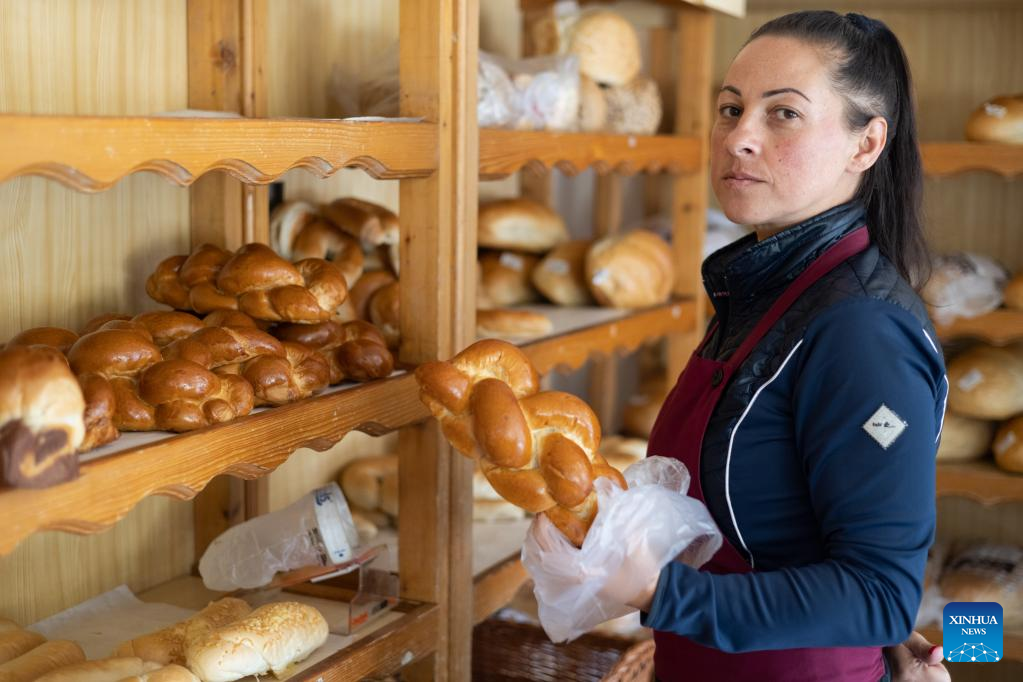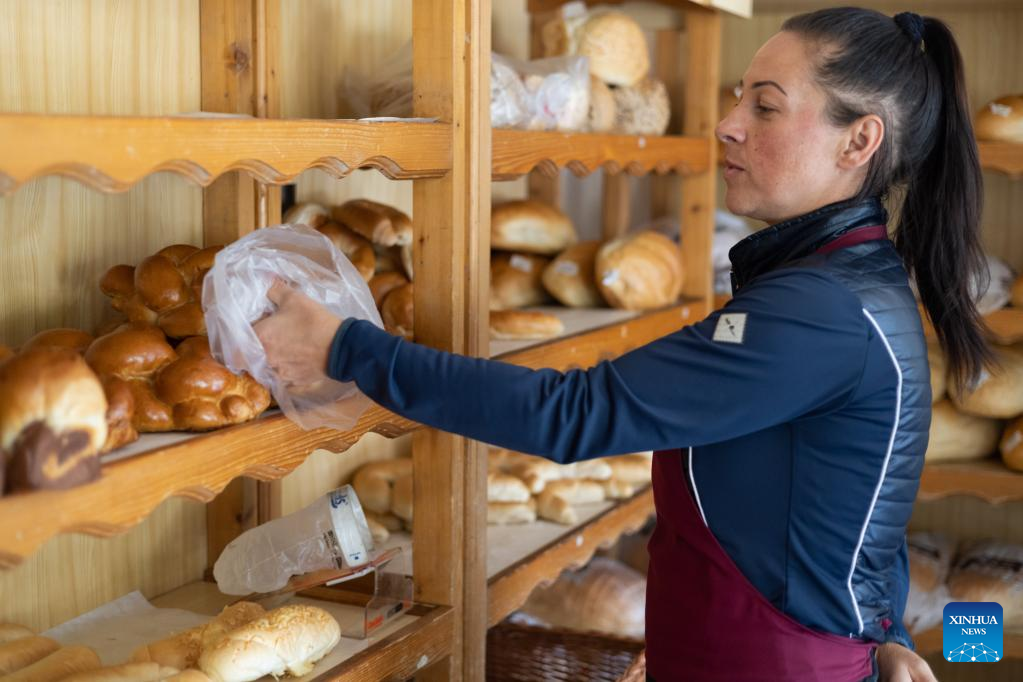
Margit Kiss, owner of the Kiss Bakery, works in her shop in Urom, a suburb of Budapest, Hungary, on Oct. 19, 2022.(Photo by Attila Volgyi/Xinhua)
By Geza Molnar
BUDAPEST, Nov. 6 (Xinhua) -- Soaring utility bills, mostly electricity and gas, make it ever harder for small companies to make ends meet in Hungary.
Margit Kiss, 42, mother of two and owner of the Kiss Bakery in Urom, a suburb of Budapest, is very frustrated, to say the least.
Even if she uses gas only to heat water, Kiss' latest gas bill jumped to 19,000 forints (45.6 U.S. dollars) a month from 3,000 forints, and her electricity bill more than doubled from 45,000 forints to 108,000 forints.
"I had to turn off the gas completely fearing a price I would not be able to pay," she said. She installed an electric heating panel in her apartment and uses the heat generated by the refrigerators to heat her bakery.
While she spoke to Xinhua, she received a delivery of "Gerbeaud" cakes at a price 20 percent higher than the week before.
"Five hundred forints for a slice of Gerbeaud? ... It was 400 last week, and you didn't even put real nuts in it, just sugar and chestnuts," she yelled at her supplier on the phone. "How am I supposed to sell this? "
She explained that in light of such a price hike, she will not order Gerbeaud cakes again as she won't be able to sell them without a loss.
Gerbeaud cakes count among the best-known desserts in Hungary. It is a delicious layered yeast cake with an apricot walnut filling, covered in a thin chocolate glaze. Traditionally it is a holiday dessert, made at Christmas or Easter time. They are becoming more and more expensive because food and energy prices are on a steady increase.
The conflict between Russia and Ukraine has sent raw material prices rocketing. Flour and bread prices have soared as a result of supply chain disruptions, and the cuts to Russian gas supplies have had the same effect on energy prices.
In August, the government removed the cap on energy prices, which means that now companies and institutions must pay market prices. Households consuming above the national average are also affected. For them, electricity prices have doubled and the price of gas has increased sevenfold.
And that is not much, as she keeps only the refrigerators for dairy products running. The ones for soft drinks are now unplugged and just used as shelves, which means customers can not enjoy ice-cold beverages anymore.
The prices of her products have also increased significantly: an average loaf of bread now costs 700 forints, up from 500 forints in the summer and around 350 forints back in February.
Bread prices in September in Hungary increased by 76.9 percent from a year ago, making the hike the highest in the European Union (EU), Eurostat, the EU's statistical office, said.
According to the Organization for Economic Co-operation and Development (OECD), food price inflation in Hungary in August was 33.1 percent year-on-year, the second highest behind Türkiye.
A carton of 10 eggs, which used to cost 500 forints, now sells for 1,000 forints, and in just eight months the price of 100 grams of unsalted butter has gone up from 450 forints to 850 forints.
Her customers are flabbergasted by the price tags. "I'd rather not repeat their comments... the prices go up weekly," she complained.
Hungary's inflation rate in September was 20.1 percent year-on-year, according to the latest official figures, and analysts predict a peak of 24-25 percent later this year, before gradually falling back to lower double digits in 2023.
According to the latest poll conducted by the local publication Portfolio at the end of September, 14 percent of the country's small and medium-sized enterprises count on having to close their business.
Galloping energy prices have not caused any problems yet for Kiss' son, 5-year-old Bence, at the kindergarten, because the temperatures outdoors are still mild in Hungary.
But she worries about the winter as, under a new government decree, the temperature in the country's educational institutions cannot exceed 20 degrees Celsius (18 degrees Celsius in public administration buildings). (1 Hungarian forint = 0.0024 U.S. dollar) ■

Margit Kiss, owner of the Kiss Bakery, works in her shop in Urom, a suburb of Budapest, Hungary, on Oct. 19, 2022.(Photo by Attila Volgyi/Xinhua)

Margit Kiss, owner of the Kiss Bakery, works in her shop in Urom, a suburb of Budapest, Hungary, on Oct. 19, 2022.(Photo by Attila Volgyi/Xinhua)



